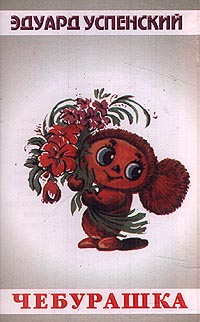INFO:
Cheburashka is a “little fellow” who looks like a monkey and a bear. He’s small and furry, with big ears, and he’s “the cutest thing ever” (according to my informant).
The character originates from a Soviet story written in 1966 and created into a stop-motion animation film in 1969 and then several animated TV series between the 1960s and 1980s. In the stories, he shows up in a crate of oranges and doesn’t know where he is or where he came from. A crocodile named Ghean befriends him and grants Cheburashka’s wish to work as a toy in a daycare center. When Cheuburashka eats oranges, he falls asleep.
The informant owns a Cheburashka doll that he got as a gift from his sister, who went to Russia recently. When you squeeze it, it sings:
“Я играю на гармошке
У прохожих на виду…
К сожаленью, день рожденья
Только раз в году.”
“And I play the accordion for all to see
Sadly (my) birthday
Is only once a year.”
BACKGROUND:
These cheburashkas are popular toys, and are cultural symbols — it was even used as a mascot/symbol for the Moscow Olympics. The informant says that he looks at Cheburashka and thinks, “That’s something that’s Russian.”
CONTEXT:
I spoke to my informant during an on-campus event.
ANALYSIS:
What’s interesting about Cheburashka is that, like Paul Bunyan, the character itself originated from a creator’s work. However, like Paul Bunyan, Cheburashka has become an integral figure in Russian culture, to the point where it was considered a Russian icon for the Moscow Olympics.
I think the character itself is very cute, but it doesn’t necessarily have any strong ties to other Russian folklore creatures? I did a little bit of research and beyond Cheburashka’s own published materials and Olympics iconography, it doesn’t seem to tie into anything that existed prior, which I find extremely interesting. Perhaps this has to do with the fact that Cheburashka was created as a Soviet icon, and even though the Soviet Union is no more, the character has survived into the modern Russian lexicon.

